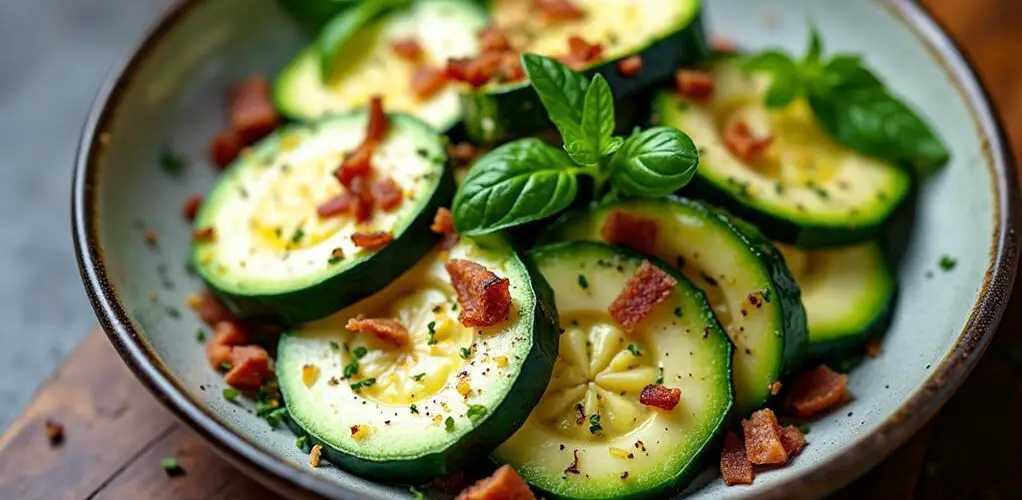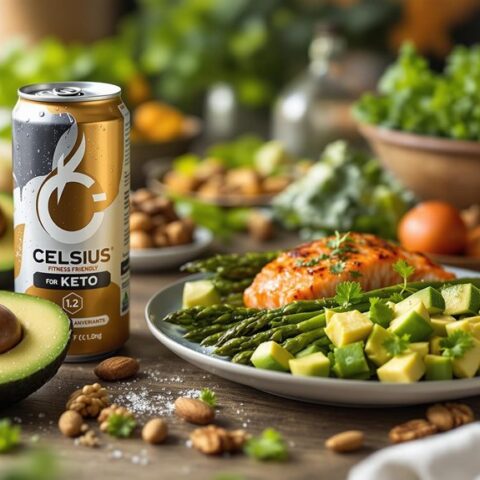
Finding keto-friendly substitutes for avocado can help diversify your diet while maintaining ketosis. Raw nuts, such as almonds and walnuts, offer a satisfying crunch and are high in healthy fats. Raw seeds, including chia and pumpkin seeds, provide essential nutrients and fiber. Nut butters, like almond and peanut butter, are versatile and support electrolyte balance. Olives are rich in monounsaturated fats and low in carbohydrates. Hard-boiled eggs are a protein-rich option with minimal carbs. Each of these foods can be seamlessly integrated into your keto regimen for variety and nutritional balance. Discover more to enhance your keto journey.
Key Takeaways
- Raw nuts are nutrient-dense, high in healthy fats, and promote sustained ketosis.
- Raw seeds like chia and hemp are low in carbs and high in protein and fiber.
- Nut butters offer healthy fats and are ideal for smoothies, dips, and keto desserts.
- Olives provide monounsaturated fats, low carbs, and versatile culinary uses.
- Hard-boiled eggs are rich in protein, healthy fats, and essential nutrients with negligible carbs.
Raw Nuts
For those seeking keto-friendly substitutes for avocado, raw nuts stand out as an excellent option. Raw nuts such as walnuts, almonds, and cashews offer a similar calorie count to avocados, typically ranging from 160-200 calories per ounce. This makes them particularly suitable for maintaining energy levels on a ketogenic diet.
Their high content of healthy fats—approximately 14-18 grams per ounce—aligns perfectly with the high-fat requirements of a keto lifestyle, promoting sustained ketosis. Additionally, nuts and seeds are nutrient-dense, providing healthy fats, protein, and fiber, which further supports a balanced diet.
Nut nutrition extends beyond just calorie and fat content. Raw nuts are also rich in essential nutrients like vitamin E and magnesium, which play significant roles in maintaining overall health and wellness.
Vitamin E functions as a powerful antioxidant, while magnesium supports muscle function and energy production—both essential for those adhering to a low-carb, high-fat diet.
However, it's important to note that while raw nuts do contain fiber, their levels are generally lower than that of avocados. Consequently, portion control is essential to meet daily fiber requirements effectively.
For ideal health benefits and to keep carbohydrate intake low, it is advisable to select raw varieties without added oils or sugars.
Raw Seeds
While raw nuts provide an excellent keto-friendly alternative to avocado, raw seeds also present a compelling option for those adhering to a ketogenic diet. Various seed varieties, such as pumpkin seeds, chia seeds, and hemp seeds, offer distinct health benefits while maintaining low carbohydrate content.
Pumpkin seeds are a particularly nutrient-dense choice, offering around 19 grams of fat and 9 grams of protein per 100 grams. This macronutrient profile makes them an ideal snack or salad topping for those on a keto diet.
Chia seeds, although slightly higher in carbohydrates, have a remarkable fiber content of 34 grams per 100 grams, which can help manage hunger by absorbing water and expanding in the stomach. Additionally, chia seeds aid in increasing satiety and slowing digestion, which is beneficial for weight management.
Hemp seeds are another versatile option, boasting an impressive 32 grams of protein per 100 grams and minimal carbohydrate content. They can be easily incorporated into smoothies or salads, adding not just nutritional value but also a pleasant texture.
When integrating raw seeds into a ketogenic diet, portion control is essential. Their high calorie density can lead to inadvertent overeating, which may counteract the diet's benefits.
Therefore, mindful consumption is vital to harnessing the full health benefits of these seed varieties.
Nut Butters
When considering keto-friendly substitutes for avocado, nut butters emerge as a nutritious and convenient option. Natural nut butters like almond and peanut butter provide a similar calorie count to avocados, typically around 190-200 calories per 2-tablespoon serving.
These butters are rich in healthy fats, offering approximately 16-18 grams per serving, which aligns well with the high-fat requirements of a ketogenic diet. Additionally, they provide 7-8 grams of protein per serving, enhancing satiety and supporting muscle maintenance.
It's important to select varieties with minimal ingredients—ideally just nuts and a pinch of salt—to avoid added sugars and unhealthy oils. Nut butters also contribute to maintaining electrolyte balance, which is essential for hydration and preventing keto flu symptoms.
Here are three practical tips for incorporating nut butters into your keto diet:
- Nut Butter Smoothies: Blend a tablespoon of almond butter with unsweetened almond milk, spinach, and a low-carb protein powder for a quick, nutrient-dense breakfast.
- Nut Butter Dips: Use natural peanut butter as a dip for low-carb vegetables like celery or bell peppers, adding a satisfying crunch to your snack.
- Nut Butter Desserts: Create keto-friendly nut butter recipes such as fat bombs by mixing nut butter with coconut oil and chilling them for a quick, indulgent treat.
Olives
Among the keto-friendly substitutes for avocado, olives stand out as a nutritious and versatile option. Olives are rich in healthy fats, with ten stuffed olives containing approximately 100 calories and 10 grams of fat, making them an excellent low-carb alternative. Significantly, they provide a good source of monounsaturated fats, akin to those found in avocados, which are beneficial for heart health.
Additionally, the keto diet shows promise in reducing inflammatory markers, which aligns with the anti-inflammatory properties of olives.
Diverse olive varieties, such as Kalamata, Manzanilla, and Castelvetrano, offer distinctive flavors and textures, enhancing their culinary versatility. These olives can be effortlessly incorporated into salads, enjoyed as snacks, or used as toppings to enhance the taste of various dishes, aligning well with keto dietary goals.
Moreover, olives are low in carbohydrates, typically containing around 1 gram of carbs per ten olives. This low-carb profile is ideal for maintaining ketosis.
Beyond macronutrients, olives also offer a plethora of antioxidants and possess anti-inflammatory properties, contributing to overall health benefits. These olive health benefits make them a valuable addition to a keto diet, promoting not only heart health but also general well-being.
Hard-Boiled Eggs
In addition to olives, another exemplary keto-friendly substitute for avocado is the hard-boiled egg. With approximately 14.1 grams of protein and 9.6 grams of fat per 100 grams, hard-boiled eggs are nutrient-dense and align well with a ketogenic dietary framework.
Unlike avocados, hard-boiled eggs contain negligible carbohydrates, making them an ideal option for those committed to maintaining a low-carb diet. Each large hard-boiled egg provides about 68 calories, allowing for a satisfying addition to meals without a significant increase in caloric intake.
Eggs also contribute to improved insulin sensitivity, which is essential for type 2 diabetes management. Egg nutrition extends beyond macronutrients; eggs are rich in choline, a nutrient vital for brain health, complementing the heart-healthy benefits typically associated with avocados.
The versatility of hard-boiled eggs is also significant, as they can be easily prepared in advance, making them a convenient staple for meal prep. Here are three practical ways to incorporate hard-boiled eggs into your keto meal plan:
- Salads: Add sliced hard-boiled eggs to green salads for a protein boost.
- Snacks: Enjoy them as a standalone snack, seasoned with salt and pepper.
- Breakfast dishes: Incorporate hard-boiled eggs into breakfast bowls alongside other low-carb ingredients.
Frequently Asked Questions
What Is a Keto Substitute for Avocado?
Olives, eggs, nut butters, pesto, and raw seeds offer nutritional benefits similar to avocado, making them ideal keto substitutes. These options provide healthy fats and can be incorporated into various recipe ideas to maintain ketosis effectively.
What Is the Best Alternative for Avocado?
The best alternative for avocado, considering nutrient density and taste profile, is olives. They offer similar healthy fats and calories, enhancing the flavor of low-carb meals while providing a comparable nutrient-rich option.
How Do You Eat Avocado When You Don't Like It Keto?
To enjoy avocado on a keto diet despite disliking its taste, consider creative recipes that incorporate flavor enhancements, such as blending it into smoothies with cocoa powder or incorporating it into salad dressings with olive oil and spices.
What Is Equivalent to Eating an Avocado?
For an equivalent to eating an avocado regarding nutrient density and healthy fats, consider raw nuts, pumpkin seeds, hemp seeds, or natural nut butters. Each provides comparable calories, fat content, and essential nutrients.
Conclusion
To sum up, incorporating keto-friendly substitutes for avocado, such as raw nuts, raw seeds, nut butters, olives, and hard-boiled eggs, can provide a diverse array of nutrients while adhering to a ketogenic diet. Each alternative offers unique health benefits, ensuring that dietary goals are met without compromising nutritional balance. These substitutes can effectively replace avocados in various dishes, supporting a keto lifestyle with versatility and nutritional adequacy.










No Comments